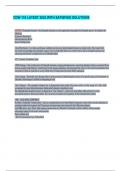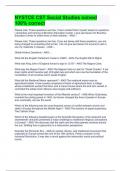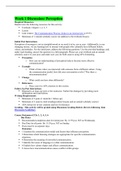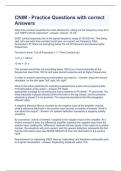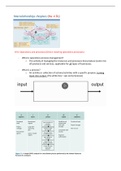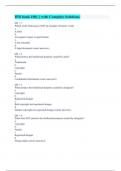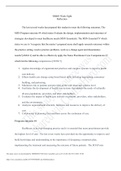Issues and debates
, Gender and Culture in psychology: Gender bias
AO1 AO3
● Universality: When characteristics of human beings can be applied to all despite P Gender differences seen as fixed and enduring when this is not always the case
gender and upbringing differences E Maccoby and Jacklin → reviewed multiple gender studies which concluded that
● Psychology attempts to conduct research that is objective and value free but girls had superior verbal skills vs boys had better spatial ability
psychologists possess beliefs and values that are influenced by social and Findings were suggested to be hardwired into the brain and became popularised
due to them fitting the gender stereotypes of girls as speakers and boys as doers.
historical contexts which may influence and conclusions which can undermine
Joel et al used brain scans and found no difference
universality of research C Therefore we must be careful to accept biological differences as they may be
● Gender bias: When psychological research/ theories do not offer a justifiable based upon stereotypes
representation of experience or behaviour of men or women
● Alpha bias: When research exaggerates the differences between men and P However this doesn’t mean that psychologists should avoid gender differences
E Ingalhalikar et al suggests that there is some truth behind the idea that females
women usually devaluing women
are better at multitasking than men as brain scans found women benefit from
● Differences are presented as real, fixed, enduring and inevitable stronger connections between the LH and RH vs men
● EXAMPLE: Freud’s psychosexual stages of development = men’s fear of C Biological differences do exist but we need to be careful when concluding their
castration = ↑ anxiety = ↑ pressure to identify with same sex parent = stronger effects on behaviour
superego vs women = women are morally inferior to men = feminity is an
expression for failed masculinity = vanity : defence mechanism to make up for
sexual inferiority to men P Gender bias promoted sexism in the research process
● Beta bias: When research ignores/ underestimates differences between men E Women remain underrepresented in university departments especially science
and women and with most research using university students samples are likely to be
● EXAMPLE: Fight or flight response = often male animals are used as female unrepresentative of women. Murphy et al stated that although many undergraduate
behaviour is influenced by hormonal changes from ovulation = ignores classes are female, lecturers tend to be male and research is also likely to be
differences and assumes fight or flight response is the same universally = conducted by males which may affect female participation in studies
Shelley Taylor et al found this is not true = oxytocin concentrations are higher in C Psychology may be producing findings that are gender biased
women = women respond to situations of stress by increasing oxytocin =
P Research challenging gender bias may not be published
reduced fight or flight response = enhanced tend and befriend response
E Formanowicz et al → reviewed more than 1000 articles relating to gender bias
● Androcentrism: “male centred”
over 8 years and found that they were likely to be underfunded and published in
● American psychological association = only 6/ top 100 most influential
less prestigious scientific journals = fewer scholars became aware of research so
psychologist were women
they could apply it to their own work
● PMS diagnostic category medicalises female emotions e.g anger by explaining
C Suggests gender bias is not taken seriously in psychology
this in hormonal terms vs men as rational response to external pressure
,Gender and Culture in psychology: Cultural bias
Culture bias - A tendency to interpret all phenomena through the ‘lens’ of one’s own
culture, ignoring the effects that cultural differences might have on behaviour
Universality and bias
❏ Universality - The idea of being able to generalise human characteristics and
behaviours to all people, regardless of experiences and upbringing including culture
❏ Henrich et al = reviewed hundreds of studies and found that
❏ 68% of Pps came from the US
❏ 96% of Pps were from industrialised nations
❏ Arnett = review found that 80% of Pps were psychology students
❏ Findings like those from Henrich and Arnett suggest that there is a strong cultural
bias in psychology
❏ This means that ‘facts’ we think we may have discovered about universal human
behaviours are culturally biased
,Gender and Culture in psychology: Cultural bias
❏ Henrich et al coined the term ‘WEIRD’ to describe the group of people who were
most likely to be studied by psychologists:
Western
Educated
Industrialised
Rich
Democracies
❏ If the norm/ standard are ‘WEIRD’ people then those who are not ‘WEIRD’ may
be seen as abnormal
,Gender and Culture in psychology: Cultural bias
Ethnocentrism
❏ Ethnocentrism - when a person judges other cultures by the standards and
values of their own culture
❏ In its most extreme form = refers to the belief in the superiority of one’s own
cultural group
❏ Example: Ainsworth’s Strange Situation
❏ Only reflected norms and values of american culture e.g that moderate sign of distress upon
separation from mother figure symbolic of the ideal attachment type - secure attachment
❏ However it was used to make judgements about the attachment types of babies from other cultures
and didn’t take into account the differences in child rearing practices
❏ Takahashi = Japanese infants were more likely to be described as insecurely attached BUT
japanese babies are very rarely separated from mothers which is the most likely reason they
showed more distress when separated
,Gender and Culture in psychology: Cultural bias
Ethnocentrism
❏ American psychologist = used a picture IQ test to estimate the IQ of all
recruits to the forces during WW1
❏ >1 million people tested
❏ Results were published in 1921
❏ Task = to point out what was missing from a series of pictures
❏ The psychologist believed the test was a measure of innate intelligence
and so when he discovered that recent immigrants to America did not
score very well on the test he concluded that they were less intelligent than
Americans and should not be allowed to enter the country and its forces
,Gender and Culture in psychology: Cultural bias
Cultural relativism
❏ Cultural relativism - the idea that norms and values can only be meaningfully understood within
specific cultural contexts
❏ Berry (1969) = made a distinction between etic and emic approaches in studying human behaviour
❏ Etic approach - looks at behaviour from outside of culture and attempts to describe those
behaviours as universal
❏ Emic approach - looks at behaviour from inside a culture and identifies behaviours that are specific
to that culture
❏ Ainsworth’s research is an example of an imposed etic
❏ She studied behaviour within a single culture (America) and then assumed her ideal attachment type could be applied
universally
❏ Another example is definitions of abnormality
❏ Lefley and Pedersen argued that European/ American ideas about what is mentally healthy is not shared by the rest of
the world
❏ Characteristics e.g self sufficiency, independence and goal-orientated behaviour and internal locus of control (LOC) is
often regarded as indicators of mental health amongst US and European clinicians
❏ These characteristics may depend of if countries are individualist or collectivist countries - not necessarily meaning that
they are mentally unwell
,Gender and Culture in psychology: Cultural bias
❏ Berry argues that psychology has often been guilty of imposing an etic
approach arguing that theories, models concepts etc are universal when
they actually came from emic research within a single culture
❏ The suggestion is that psychologists should be much more mindful of the
cultural relativism of their research -
❏ that things that they discover can only make sense from the perspective of the culture
within which they were discovered
❏ Being able to recognise this is one way of avoiding cultural bias in research
,Gender and Culture in psychology: Cultural bias
Evaluation:
P Increased media globalisation has meant
P Many of the most influential studies in psychology that the individualist-collectivist distinction
are culturally biased
no longer applies
E Cultural bias is a feature found in many classic
studies of social influence E Traditional argument = individualist
countries e.g US value individuals and
Asch and Milgram’s original studies were conducted
independence whilst collectivist countries e.g
using mainly white, middle class, American students
India and China value society and needs of
When being replicated in different countries, results the group
produced were rather different
Takano and Osaka = 14/15 studies that
Smith and Bond = Asch type experiments in
collectivist cultures found significantly higher rates of compared US and Japan found no evidence
conformity than the original individualist US culture of individualism or collectivism - describing
the distinction as lazy and simplistic
C Suggests understanding of such topics should only
apply to individualist cultures C Cultural bias = less of an issue
, Gender and Culture in psychology: Cultural bias
P Culture bias has led to prejudice against groups of people
E Gould = explained how the first intelligence tests led to eugenic
Evaluation: social policies in the US
American psychologists pilotted their first IQ tests on 1.75
P Emergence of cultural psychology
million army recruits
E Cohen = cultural psychology is the study of Many items on the tests were ethnocentric e.g assuming
how people shape and are shaped by their everyone would know the names of US presidents
cultural experiences Recruits from south eastern Europe and African-Americans
received the lowest scores
Incorporates studies from anthropology,
sociology and political science These low scores were the used to inform racist discourse and
genetic inferiority of particular groups rather than a sign of the
test’s inadequacy
Cultural psychologists take emic approaches
and conduct research inside the culture Ethnic minorities were deemed as ‘mentally unfit’ and ‘feeble-
minded’ when compared to a white majority
C Modern psychologists are aware of the
As a result these groups were denied educational and
dangers of cultural bias professional opportunities
C Cultural bias can be used to justify prejudice and
discrimination towards specific cultures/ groups



